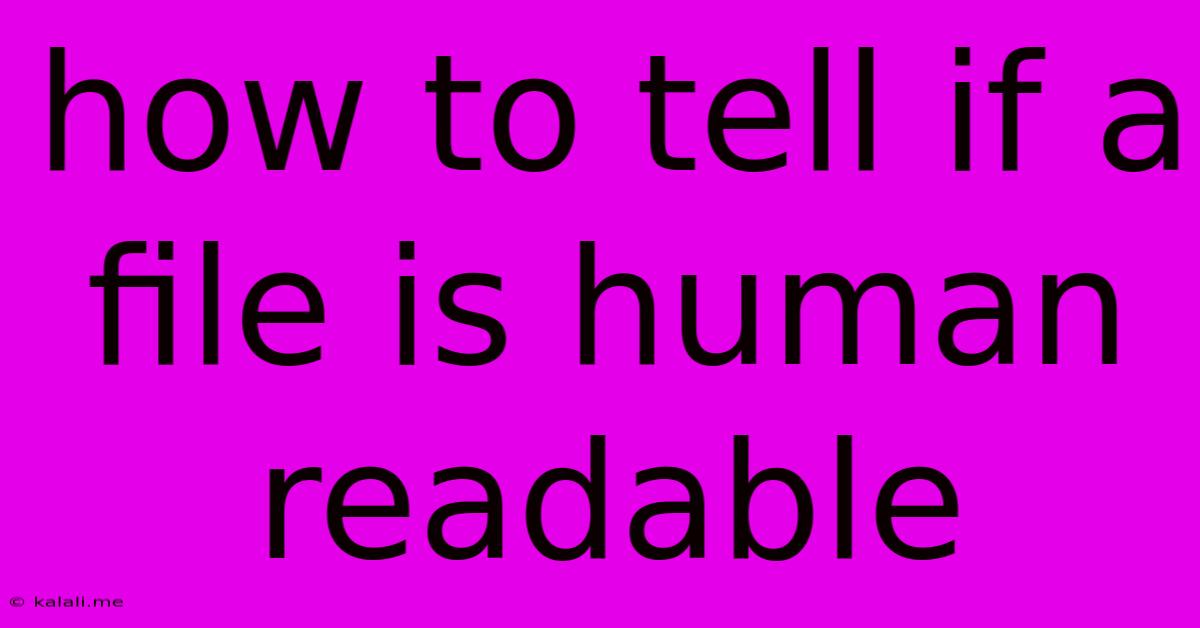How To Tell If A File Is Human Readable
Kalali
May 24, 2025 · 3 min read

Table of Contents
How to Tell if a File is Human-Readable
Determining if a file is human-readable isn't always straightforward. While some files clearly display text, others might require specific software or knowledge to interpret their contents. This article explores various methods to identify human-readable files, covering different file types and scenarios. Understanding file extensions, using text editors, and examining file headers can all contribute to accurate identification.
What Makes a File Human-Readable?
A human-readable file contains data structured in a way that humans can easily understand and interpret without specialized tools. This typically means the data is encoded in a character encoding such as ASCII or UTF-8, representing text, numbers, or symbols. Conversely, non-human-readable files might contain binary data, compiled code, or other formats requiring specific programs for interpretation.
Methods to Identify Human-Readable Files:
1. Examine the File Extension:
The file extension (e.g., .txt, .html, .csv, .log) often indicates the file type. Common human-readable extensions include:
.txt: Plain text files..html,.htm: HyperText Markup Language files (web pages)..csv: Comma-separated values files (spreadsheets)..log: Log files (often contain human-readable text records)..md: Markdown files (plain text with formatting)..xml: Extensible Markup Language files (structured data)..json: JavaScript Object Notation files (structured data)..pdf: Portable Document Format files (While containing text, they require a PDF reader).
However, extensions aren't always reliable. A file might have an incorrect or missing extension.
2. Use a Text Editor:
Opening a file with a plain text editor (like Notepad on Windows, TextEdit on macOS, or similar editors) is a reliable method. If the editor displays readable characters, the file is likely human-readable. If you see gibberish, symbols, or strange characters, it’s probably not human-readable. Note that specialized formats like .pdf or .docx might display source code instead of formatted content in a plain text editor.
3. Check the File Header (for advanced users):
Some files contain a header that specifies their format. You can view the first few bytes of a file using a hex editor or command-line tools (like head or xxd on Linux/macOS). Examining these header bytes can sometimes reveal if the file is text-based or binary. This method requires understanding different file signatures. For example, a .jpg file typically starts with FF D8 FF. However, this technique needs technical expertise and caution; incorrect interpretation can lead to data loss.
4. Contextual Clues:
The file's name and location can provide clues. Files found in directories associated with text documents (like /etc/ on Linux or C:\Windows\System32 on Windows for configuration files) might contain human-readable data even if extensions aren't obvious.
Challenges and Exceptions:
- Encoded Files: Files encoded using specialized encoding schemes might not appear readable unless you decode them using the appropriate tools.
- Compressed Files: Compressed files (like
.zip,.gz,.rar) require decompression before determining readability. The underlying files could be human-readable or not. - Binary Files with Embedded Text: Some binary files embed human-readable data within their structure.
Conclusion:
Determining if a file is human-readable often involves a combination of techniques. Examining the file extension is a good starting point, but opening the file in a text editor provides a more definitive answer in many cases. For more advanced scenarios, analyzing the file header or leveraging contextual information can be necessary. Remember that some files might require specific software or knowledge to interpret correctly.
Latest Posts
Latest Posts
-
How Many Months Is A Hundred Days
Jul 18, 2025
-
Mother And I Or Mother And Me
Jul 18, 2025
-
How Many Oz In One Water Bottle
Jul 18, 2025
-
How Many Dimes In A 5 Roll
Jul 18, 2025
-
How Do You Say Basil In Spanish
Jul 18, 2025
Related Post
Thank you for visiting our website which covers about How To Tell If A File Is Human Readable . We hope the information provided has been useful to you. Feel free to contact us if you have any questions or need further assistance. See you next time and don't miss to bookmark.